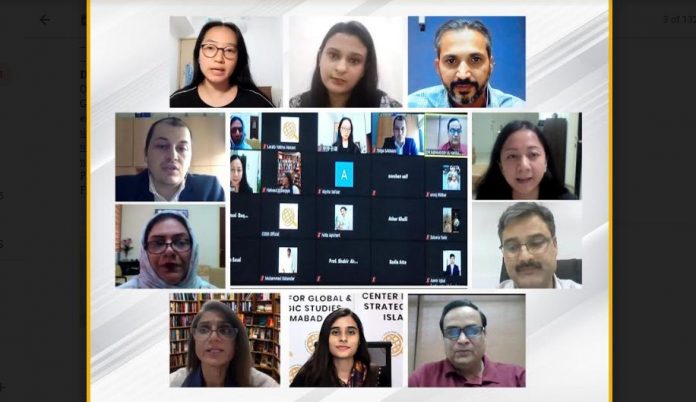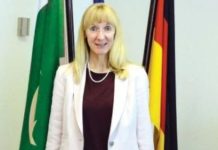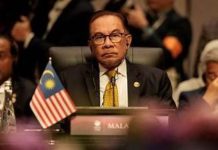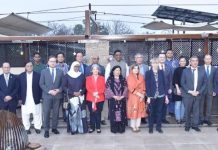ISLAMABAD, MAR 31 (DNA) – An Online International Conference on “Evolving Global Security Challenges in the Post-COVID World” was organized by the Center for Global & Strategic Studies (CGSS), Islamabad.
The conference commenced with the opening remarks of Dr. Mehmood Ul Hassan Khan, Member Board of Experts, Center for Global & Strategic Studies (CGSS), Islamabad& Regional Geopolitical Analyst.
He stated that the COVID 19 pandemic has further disorganized existing global challenges, further exposing the underlying causes of insecurity, social and economic inequality with overtones of racial tension and nationalism. Furthermore, it is the knowledge that must be provided to decision-makers in-charge of internal and civil security to shift from forecasts to informed actions.
Mr. TolgaSakman, Chairman, Center for Diplomatic Affairs and Political Studies (DIPAM), Istanbul, Turkey discussed re-evaluating the international security architecture in the Post-Covid-19 era, potential areas, and policy options for Eurasia.
He further highlighted that the post-covid era has altered the security architecture. In recent years central Asia, East Asia, andthe Baltic sea have become crucial as Russia and China work on post-liberal political and economic arenas. Post covid security architecture has resulted in new consequences as the global supply chains have high effects on how democratic establishments can rescale peoples’ employment. He mentioned the idea of Global Partnership Cooperation to be the most essential ingredient for this new change.
Prof. Dr. Iram Khalid, Chairperson, Department of Political Science & IR, University of the Punjab, Lahore, Pakistan emphasized the impact of COVID-19 on the security dynamics of Asia
According to Dr. Iram, there are three major components to security dynamics that first and foremost include compartment reservation of Asia. It has become challenging to practice nontraditional security power. She emphasized the contemporary concepts where national security depends greatly upon the tangible and non-tangible interests and elements. Furthermore, keeping in view the concept of commonality on an international scale, paradigms of new discussions have opened for foreign policymakers. She also mentioned that interconnectivity has altered the designs of traditional security into non-traditional security. Therefore, orthodox paradigms need revision to facilitate the worldwide new connections.
Dr. Adam Saud, Dean, Faculty of Humanities & Social Sciences, Bahria University, Islamabad, Pakistandiscussed the shifting of focus from the War on terror towards the strategic competition between the US, China, and Russia.
He further commented that the post-cold war political scenario changed as the US wanted to establish its global might. War on terrorism dominated global politics previously but post 2008, as the US underwent an economic crisis China began to revitalize the geo-economics realm. He emphasized that on the creation of geopolitical capital there is a gap to know who is the great power coefficient of the future? According to Dr. Adam Saud, the economic crisis and problems arising from lack of consensus can be tackled if the US recognizes China’s strategic competitiveness. Furthermore, in the contemporary era,the position holders will be visible as per their positive role.
Dr. Shafiah F Muhibat, Director of International Relations, Center for Strategic and International Studies (CSIS), Jakarta, Indonesia discussed the Security Challenges and Alignments in East Asia.
She further elaborated some major areas to illustrate the regional security challenges; maritime security, great power politics, humanitarian challenges, and challenges posed by Covid-19. She believed that further assistance and cooperation of regional states can enhance Maritime security. Dr. Shafiah further added to the discussion by signifying the cooperative role of hyper-potential countries like Korea in peacefully settling clashes. She also emphasized that despite the great power politics and tensions South Asia carries huge potential to smoothen the scenario by setting regional order as the top priority. This can be done by establishing trust and covering relations by efficiently responding to the challenges.
Dr. Aiysha Safdar, Head of International Relations Department, Kinnaird College For Women University, Lahore, Pakistan shared her views on redefining national security in the context of Pakistan
She also discussed that the arrival of Covid-19 has exposed the vulnerabilities on several fronts. Human security is a huge part of the national security caused by poverty, terrorism, economic downturns, etc. As the insecurities overlap they expand and take roots in several domains of societal strata. Highlighting the issues faced by the educational institutions she mentioned that the education sector has suffered due to lacking sustainable developmental goals as traditional learning shifted to online learning. Hence, the heavy long-term changes and challenges to mankind require a reinvention of new paradigms of national security and geo-strategies and heavy investments in human health.
Mr. Shakeel Ahmed Ramay, Director, China Study Center, Sustainable Development Policy Institute (SDPI), Islamabad, Pakistan highlighted how the Covid-19 pandemic is reshaping the China-US competition
He also discussed that given the global pandemic future changes are introducing new competitions in two major areas i.e. in the economy and the mobility capacity. In the present-day globalization process, technological emergence leads to competition in the better mechanized technological supply chains. Thus, having technology as the key area there is serious increasing competitiveness between China and the US. Therefore, the advantage can only be gained by countering the negative impacts of this growth and securing positive productive outcomes.
Dr. Naheed S. Goraya, Assistant Professor, Centre for South Asian Studies, University of the Punjab, Lahore, Pakistan discussed the collaborative approach worldwide to counter Non-Traditional Security Threats.
She further discussed that keeping in view rising Islamophobia it is important to give rise to cohesion and economic cooperation. We have to understand that the lack of knowledge is hindering integration and resulting in a rise to the vulnerability of isolation. If the issue is not addressed in time it will generate identity-based extremism because of politicizing of religion. We have to understand the main drivers of Islamophobi as and its relation with radicalism. To counter this symbiotic relation, Muslim leaders must actively promote Islamic theologies, to create trust and understanding. This would create harmony on inter-cultural grounds.
Prof. Sun Lu, Associate Professor, School of Government & Public Affairs, Communication University of China, Beijing, Chinadiscussed China’s approach in the context of rising Multi-polarity and the Emerging geopolitical environment
She also highlighted that from the historic content of almost a hundred years ago, it can be seen that the various wars like the Iraq war and the Syrian war are the practical depiction of the Clash of Civilizations approach. In the past pandemic times and changing world dynamics, Sino-US relations are splitting the world into geopolitical groups. Therefore, China in efforts of introducing the new ideals aims to resolve this potential division. She further mentioned the idea of a community with a shared future and the potential positive impacts on the global community.
The conference was moderated by Ms. Laraib Fatima Hassan, Communication & Coordination Manager, Center for Global & Strategic Studies (CGSS), Islamabad, and was attended by 100 participants including regional experts, members of academia, and students of International Relations and related fields.
The conference was also viewed live on various social media platforms by 200 viewers.=DNA
=========================












